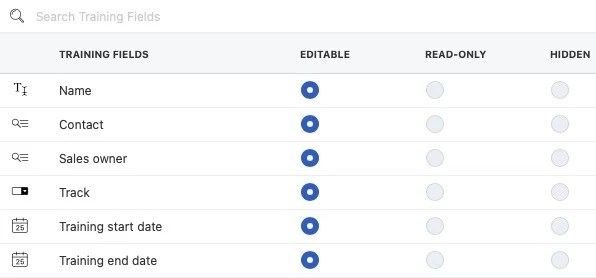Is it possible to allow some users to create a custom module record and change a field while creating the record but not edit the field value later when editing the custom module record? (even if they own it).
Here is an example:
We have a custom module record “Training” with a field cf_contact. When a sales owner creates the record, they should be able to set cf_contact. But if they sales owner then edits the record, they can no longer change cf_contact.
I see under Admin Settings > Roles > Manage Roles > Sales user > Permissions that I can allow sales user to create but not edit the record. But this applies to all fields in the record. Can I make it so that the Sales user can edit other fields but not the cf_contact?
It seems from the “Field Permissions” that if I make the field read-only the Sales user can’t set the field when creating the record.

And there does not seem to be other options.




